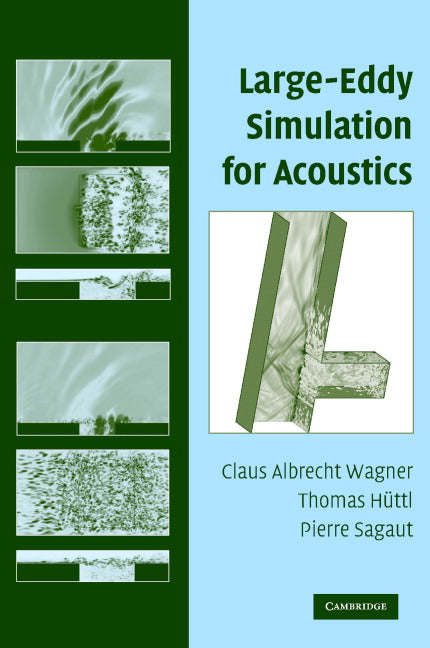Freshly Printed - allow 8 days lead
Couldn't load pickup availability
Large-Eddy Simulation for Acoustics
This 2007 book is about large-eddy simulation (LES) used for noise-reduced design and acoustical research.
Claus Wagner (Edited by), Thomas Hüttl (Edited by), Pierre Sagaut (Edited by)
9780521871440, Cambridge University Press
Hardback, published 15 January 2007
470 pages
25.4 x 17.8 x 2.5 cm, 0.97 kg
Review of the hardback: '… a timely publication in addressing one of the important impacts of man-made machines … on the environment we all live in. … I would strongly recommend this book to graduate students, researchers, and practical engineers who are interested in the simulation of noise generated by turbulent flows with large separations. It serves as a worthwhile introduction, reference, or handbook to the field of computational aeroacoustics, with a list of over 900 papers cited.' Proceedings of the Institution of Mechanical Engineers
Noise pollution around airports, trains, and industries increasingly attracts environmental concern and regulation. Designers and researchers have intensified the use of large-eddy simulation (LES) for noise reduced industrial design and acoustical research. This 2007 book, written by 30 experts, presents the theoretical background of acoustics and of LES, followed by details about numerical methods, e.g. discretization schemes, boundary conditions, coupling aspects. Industrially relevant, hybrid RANS/LES techniques for acoustic source predictions are presented in detail. Many applications are featured ranging from simple geometries for mixing layers and jet flows to complex wing and car geometries. Selected applications include scientific investigations at industrial and university research institutions.
Preface
Part I. Introduction: 1. The importance of acoustic research Thomas Huettl
2. Introduction to computational aeroacoustics Manuel Kessler
3. State of the art: LES for acoustics Claus Wagner, Oliver Fleig and Thomas Huettl
Part II. Theoretical Background: Aeroacoustics Avraham Hirschberg and Sjoerd Rienstra
Part III. Theoretical Background: Large-Eddy Simulation Pierre Sagaut
Part IV. Use of Hybrid RANS/LES for Acoustic-Source Predictions Paul Batten, Philippe Spalart and Marc Terracol
Part V. Numerical Methods: 4. Spatial and temporal discretization schemes Tim Broeckhoven, Jan Ramboer, Sergey Smirnov and Chris Lacor
5. Boundary conditions for LES Michael Breuer
6. Boundary conditions: acoustics Fang Q. Hu
7. Some concepts of LES-CAA coupling Wolfgang Schroder and Roland Ewert
Part VI. Applications and Results of Large-Eddy Simulations for Acoustics: 8. Plane and axisymmetric mixing layers Christophe Bogey and Christophe Bailly
9. Far-field jet acoustics Daniel J. Bodony and Sanjiva K. Lele
10. Cavity noise Xavier Gloerfelt, Christophe Bogey and Christophe Bailly
11. Aero-elastic noise Sandrine Vergne, Jean-Marc Auger, Fred Perie, Andre Jacques and Dimitri Nicolopoulos
12. Trailing edge noise Roland Ewert and Eric Manoha
13. Blunt bodies (cylinder, cars) Franco Magagnato
14. Internal flows Philippe Lafon, Fabien Crouzet and Jean Paul Devos
15. Industrial aeroacoustics analyses Fred Mendonca
Part VII. Conclusions Claus Wagner, Pierre Sagaut and Thomas Huettl.
Subject Areas: Aerospace & aviation technology [TRP], Mechanics of fluids [TGMF]


